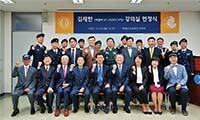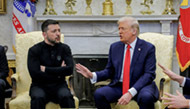
Barack Obama advocates government spending to boost U.S. competitiveness. He spoke on economic issues in June.
By WILLIAM J. BROAD and CORNELIA DEANFor decades, the United States dominated the global technological revolution. Today, that dominance is eroding. The nation’s high-technology balance of trade - the annual gap between exports and imports - is expected to be the largest ever this year, approaching $60 billion.
Both presidential candidates have made detailed arguments on how the nation can sharpen its competitive edge. Yet their visions are strikingly different. They diverge mainly on the appropriate role for the federal government.
Senator John McCain, the Republican nominee, seeks to encourage innovation by cutting corporate taxes and ending what he calls “burdensome regulations” that he says inhibit corporate investment.
Senator Barack Obama , the Democratic nominee, looks to the federal government to finance science, math and engineering education, as well as research that can produce valuable industrial applications.
At the request of The New York Times, the Information Technology and Innovation Foundation, a nonpartisan research group in Washington, estimated the annual costs of the plans and put Mr. Obama’s at $85.6 billion and Mr. McCain’s at $78.8 billion, excluding his proposed reductions in corporate taxes.
“The pressures of an unfolding fiscal crisis make these priorities recede on the list of what politicians want to do,” said Robert Reischauer, director of the Congressional Budget Office from 1989 to 1995.
Mr. McCain became chairman of the Senate Committee on Commerce, Science and Transportation in 1997 and held the position until early 2005. Though often approving of business and deregulation, he could reverse course if the issue impinged on what he saw as national security concerns.
One initiative of his sought to restrict exports of certain high-tech goods. “It’s critical that safeguards are in place,” he said in 1998 at a hearing on missile and satellite exports to China.
Republicans later charged the Clinton administration with dangerous irresponsibility in allowing the Chinese to import high-performance computers. The Republican efforts helped tighten export regulations. But technology analysts faulted the attack as political and the new rules as unnecessary.
Domestically, the commerce committee sought over the years to spur things like Internet development, the private space industry and the commercial licensing of federally owned inventions. In 2005 Mr. McCain introduced a bill to limit heattrapping gases that also sought to spur the development of green technologies.
Later that year, the National Academies, the nation’s most eminent scientific and engineering organization, issued an influential report calling for an urgent effort to boost American competitiveness. It proposed, among other things, that the government increase the basic research budget by 10 percent a year for seven years; finance scholarships for math and science teaching careers and college-level study of science, math and engineering; and make broadband Internet access available nationwide at low cost.
In 2007 Mr. Obama joined other senators to introduce a bill that built on the report’s recommendations. He offered amendments intended to increase federal support of science education . The Senate passed the bill 88 to 8; Mr. McCain abstained. President Bush signed the bill into law, but Congress has yet to finance its programs, estimated to cost about $43 billion for the first three years.
In their campaign platforms, Mr. Mc- Cain and Mr. Obama advocate making research and development tax credits permanent. They would strengthen the position of presidential science adviser, they support human exploration of space, and they agree that access to broadband must be expanded.
But Mr. Obama proposes doubling federal financing for basic research in physics, life sciences, mathematics and engineering over 10 years. He promises to review export rules he calls outdated and sees as having “unduly hampered the competitiveness of the domestic aerospace industry.”
Mr. McCain says easing regulatory and tax burdens will encourage private spending on research. Even before the current economic crisis, he proposed freezing, at least initially, almost all discretionary federal spending - a budget category that includes federal research efforts.
스마터리빙
more [ 건강]
[ 건강]이제 혈관 건강도 챙기자!
[현대해운]우리 눈에 보이지 않기 때문에 혈관 건강을 챙기는 것은 결코 쉽지 않은데요. 여러분은 혈관 건강을 유지하기 위해 어떤 노력을 하시나요?
 [ 건강]
[ 건강]내 몸이 건강해지는 과일궁합
 [ 라이프]
[ 라이프]벌레야 물럿거라! 천연 해충제 만들기
 [ 건강]
[ 건강]혈압 낮추는데 좋은 식품
[현대해운]혈관 건강은 주로 노화가 진행되면서 지켜야 할 문제라고 인식되어 왔습니다. 최근 생활 패턴과 식생활의 변화로 혈관의 노화 진행이 빨라지고
사람·사람들
more많이 본 기사
- 美, 물류거점창고에 불체자 8만명 수용 추진… ‘아마존택배’ 방식
- 브라운대 총격범, 대학원 중퇴후 고립된 삶… “유령같은 존재”
- 기부 줄이는 미국인들…트럼프·고물가·탈종교 3중 한파
- [성탄절 문 여는 곳은] 코스코·월마트 닫고… CVS는 영업
- 안보리서 ‘베네수엘라’ 긴급회의…美 “합법” vs 중러 “주권침해”
- 대통령 상징 ‘봉황기’ 29일 0시 용산서 내리고 청와대에 걸린다
- 조지호 “尹 월담 의원 체포지시” 재증언…尹측 “사실과 달라”
- 박나래, 과거 또 파묘..이번엔 ‘나혼산’ 18L 식용유 장면
- [‘로드 레이지’ 한인 피살 현장 상세 상황] 끼어들기 시비가 비극으로… 차에서 내려 “쏴봐라” 언쟁
- 트럼프 행정부, H-1B비자 추첨 내년 2월 폐지…고임금 인력 우대
- ‘월드컵 우승 가능성’ 한국 34위·일본 16위, 韓 A조에서도 ‘세 번째’
- ‘이정후 위엄’ SF CEO+사장+단장+감독→韓 총출동! 황재균·윌리 아다메스까지 선행 참여
- 함소원, 진화와 한 지붕 이혼 부부..결국 눈물 “헤어지는 게 힘들어”
- 팀 쿡 애플 CEO, 나이키 주식 43억원어치 매입…나이키 주가↑
- “최고의 산타” 아이유, ‘21세기 대군부인’ 현장에 통 큰 선물 쐈다
- ‘박지윤과 이혼’ 최동석, 두 자녀와 데이트.. “기적 같은 일”
- 온라인쇼핑과 반품, 그리고 그 이후 1
- 제니, ‘MMA’서 불태웠다..천만 조회수 앞두고 “평생 간직할 것”
- [이민 단속] 여권 소지 시민권자들 … 2
- 트럼프, ‘나비넥타이’ 매고 연말 대중문화 시상식 일부 진행
- 역주행 승용차 덮쳐 한인 등 2명 사망
- “다카이치 내년 3월 후반 미국서 트럼프와 회담 타진”
- 크리스마스 대형 폭풍… 침수·산사태 대비 ‘비상’
- 뉴욕시 최저임금 인상⋯ 1월1일부터 17달러
- 가난해서 흙 팠는데… ‘다이아’ 캤다
- 우크라, 20개항 종전안 최신판 공개…영토 할양은 ‘미해결’
- 이대우 뉴저지한인회장, “적자 개인적으로 전액변제”
- 차기 대선 선호도… 공화 ‘밴스’ ·민주 ‘뉴섬’ 선두
- [송년 행사] KAMA USA 실버모델협회
- [부 고] 박종군 전 뉴욕청과협회장 별세
- ‘파워볼’ 열풍 계속… 오늘 잭팟상금 17억 달러
- 군 장교에서 글로벌 교육 리더로‘제2의 인생’ 을 살다
- 트럼프의 새 독트린 “미국을 다시 왜소하게”
- 맘다니, 샌더스 의원 앞에서 취임선서
- [이민 단속] 새해에도 더 공격적 단속
- 취업비자(H-1B), 고연봉자 우선 발급
- 엡스타인 자료 추가 공개… “전용기에 트럼프 8번 타”
- ‘글루텐 불내증’ 셰프가 빵집을? 고객 향한 온기 담은 바게트
- [‘로드 레이지’ 한인 피살 현장 상세 상황] 끼어들기 시비가 비극으로… 차에서 내려 “쏴봐라” 언쟁
- [삶과 생각] 제도화된 불법, 합법의 가면을 쓴 민주주의 붕괴
- H-1B비자 고임금·경력자에 우선권
- [미국은 지금] MAGA의 분열, 예… 1
- 해병대전우회 동부연합회·뉴욕해병대전우회 송년회
- 비전케어 USA 무료 백내장 수술
- 뉴욕한국라이온스클럽· 뉴욕한인합창단 한 해 마무리 합동 송년회 성황
- “온 세상에 평화를⋯”
- “은·로빈후드·인공지능 주식에 집중 투자”
- 46회째 1등 안나온 파워볼 복권 당첨금 17억달러로 껑충 뛰어
- 지평 넓히는 K-푸드… 라면·김치 이어 과자·스낵 가세
- 아시안아메리칸사법경찰자문위원회 송년회
1/5지식톡

-
 미 육군 사관학교 West Poin…
0
미 육군 사관학교 West Poin…
0https://youtu.be/SxD8cEhNV6Q연락처:wpkapca@gmail.comJohn Choi: 714-716-6414West Point 합격증을 받으셨나요?미 육군사관학교 West Point 학부모 모…
-
 ☝️해외에서도 가능한 한국어 선생님…
0
☝️해외에서도 가능한 한국어 선생님…
0이 영상 하나면 충분합니다!♥️상담신청문의♥️☝️ 문의 폭주로 '선착순 상담'만 진행합니다.☎️ : 02-6213-9094✨카카오톡ID : @GOODEDU77 (@골뱅이 꼭 붙여주셔야합니다…
-
 테슬라 자동차 시트커버 장착
0
테슬라 자동차 시트커버 장착
0테슬라 시트커버, 사놓고 아직 못 씌우셨죠?장착이 생각보다 쉽지 않습니다.20년 경력 전문가에게 맡기세요 — 깔끔하고 딱 맞게 장착해드립니다!장착비용:앞좌석: $40뒷좌석: $60앞·뒷좌석 …
-
 식당용 부탄가스
0
식당용 부탄가스
0식당용 부탄가스 홀세일 합니다 로스앤젤레스 다운타운 픽업 가능 안녕 하세요?강아지 & 고양이 모든 애완동물 / 반려동물 식품 & 모든 애완동물/반려동물 관련 제품들 전문적으로 홀세일/취급하는 회사 입니다 100% …
-
 ACSL 국제 컴퓨터 과학 대회, …
0
ACSL 국제 컴퓨터 과학 대회, …
0웹사이트 : www.eduspot.co.kr 카카오톡 상담하기 : https://pf.kakao.com/_BEQWxb블로그 : https://blog.naver.com/eduspotmain안녕하세요, 에듀스팟입니다…
케이타운 1번가
오피니언
 정숙희 논설위원
정숙희 논설위원온라인쇼핑과 반품, 그리고 그 이후
 파리드 자카리아 / 워싱턴포스트 칼럼니스트 / CNN ‘GPS’ 호스트
파리드 자카리아 / 워싱턴포스트 칼럼니스트 / CNN ‘GPS’ 호스트 트럼프의 새 독트린 “미국을 다시 왜소하게”
 김동찬 시민참여센터 대표
김동찬 시민참여센터 대표 [미국은 지금] MAGA의 분열, 예견된 균열의 시작
 임지영 (주)즐거운 예감 한점 갤러리 대표
임지영 (주)즐거운 예감 한점 갤러리 대표 [수요 에세이] 삶이라는 배를 타고
 이영창 / 한국일보 기자
이영창 / 한국일보 기자[지평선] ‘인간GPT’ 환각의 부작용
 조환동 / 편집기획국장·경제부장
조환동 / 편집기획국장·경제부장 AI로 가속화되는 노동시장 개편
 민경훈 논설위원
민경훈 논설위원‘크리스마스 캐롤’과 산타 클로스
 정재민 KAIST 문술미래전략 대학원 교수
정재민 KAIST 문술미래전략 대학원 교수 [정재민의 미디어풍경] 적과의 동침, 협력하며 경쟁하기
 김영화 수필가
김영화 수필가 [화요칼럼] 단호박의 온기
1/3지사별 뉴스

“온 세상에 평화를⋯”
숨가쁘게 달려온 2025년을 이제 1주일 남짓 남긴 채 크리스마스 이브를 맞는다. 다사다난했던 한 해를 되돌아보며 마무리하는 연말 시즌과 크리…
H-1B비자 고임금·경력자에 우선권

‘올해는 ICE 이민자 체포 광풍의 해’
올 한해동안 버지니아와 메릴랜드, DC 등에서 연방 이민당국에 체포된 사람이 1만명이 훌쩍 넘는 것으로 조사됐다. 또 미 전국적으로는 22만명…
“ATM기 사용하기 겁나네”

연말 ‘로드레이지’ 비극… 한인 총격 피살
연말을 맞아 도로 위에서 순간적으로 벌어진 운전 중 시비가 40대 한인 가장의 총격 피살 비극으로 이어졌다. 워싱턴주 레이시 경찰국과 서스턴 …
[‘로드 레이지’ 한인 피살 현장 상세 상황] 끼어들기 시비가 비극으로… 차에서 내려 “쏴봐라” 언쟁

오늘 하루 이 창 열지 않음 닫기 





















































.png)


댓글 안에 당신의 성숙함도 담아 주세요.
'오늘의 한마디'는 기사에 대하여 자신의 생각을 말하고 남의 생각을 들으며 서로 다양한 의견을 나누는 공간입니다. 그러나 간혹 불건전한 내용을 올리시는 분들이 계셔서 건전한 인터넷문화 정착을 위해 아래와 같은 운영원칙을 적용합니다.
자체 모니터링을 통해 아래에 해당하는 내용이 포함된 댓글이 발견되면 예고없이 삭제 조치를 하겠습니다.
불건전한 댓글을 올리거나, 이름에 비속어 및 상대방의 불쾌감을 주는 단어를 사용, 유명인 또는 특정 일반인을 사칭하는 경우 이용에 대한 차단 제재를 받을 수 있습니다. 차단될 경우, 일주일간 댓글을 달수 없게 됩니다.
명예훼손, 개인정보 유출, 욕설 등 법률에 위반되는 댓글은 관계 법령에 의거 민형사상 처벌을 받을 수 있으니 이용에 주의를 부탁드립니다.
Close
x